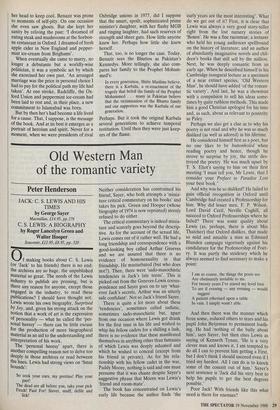Old Western Man
of the romantic variety
Peter Henderson
Of making books about C. S. Lewis (or 'Jack' to his friends) there is no end: the archives are so huge, the unpublished material so great. The needs of the Lewis industry to publish are pressing, but is there any reason for anyone, except those engaged in the industry, to read these publications? I should have thought not. Lewis wrote his own biography, Surprised by Joy, and, given his strong attack on the notion that a work of art is the expression of personality — what he called the 'per- sonal heresy' — there can be little excuse for the production of more biographical material as an aid to the understanding and Interpretation of his work.
The 'personal heresy' apart, there is another compelling reason not to delve too deeply in those archives or read between the lines. Lewis had strong views on 'Smut hounds':
So cock your ears, my pretties! Play your part!
The dead are all before you, take your pick Fetch! Paid For! Slaver, snuff, defile and lick!
Neither consideration has constrained his friend, Sayer, who both attempts a 'minia- ture critical commentary on his books' and takes his pick. Green and Hooper (whose biography of 1974 is now reprinted) sternly refused to do either.
The critical commentary is indeed minia- ture and scarcely goes beyond the descrip- tive. As for the account of the sexual life, Lewis comes out of it rather well. He had a long friendship and correspondence with a good-looking boy called Arthur Greeves and we are assured that there is no evidence of homosexuality in that friendship. He masturbated (but who does not?). Then, there were ‘sado-masochistic tendencies in Jack's late teens'. This is picked out from the Greeves-Lewis corres- pondence and Sayer goes on to say 'what- ever Jack's secrets, Arthur was an utterly safe confidant'. Not so Jack's friend Sayer.
There is quite a lot more about these `tendencies', sometimes called sadistic, sometimes sado-masochistic but, apart from one occasion where Lewis got drunk for the first time in his life and wished to whip his fellow cadets for a shilling a lash, there is no evidence that these manifested themselves in anything other than fantasies of which Lewis was deeply ashamed and which he wished to conceal (except from his friend in private). As for his rela- tionship with his fellow cadet in the war, Paddy Moore, nothing is said and one must presume that it was chaste despite Sayer's suggestive phrase that Moore was Lewis's `friend and room-mate'.
The book has concentrated on Lewis's early life because the author finds 'the early years are the most interesting'. What do we get out of it? First, it is clear that Lewis was always a very good story-teller right from the lost nursery stories of Boxen'. He was a fine raconteur; a lecturer who held his young audiences spellbound on the history of literature; and an author of abundantly imaginative novels and chil- dren's books that still sell by the million. Next, he was deeply romantic from an early age. When he described himself in his Cambridge inaugural lecture as a specimen of a near extinct species, 'Old Western Man', he should have added 'of the roman- tic variety'. And last, he was a showman with a compulsion to sell his ideas some- times by quite ruthless methods. This made him a good Christian apologist for his time and, as such, about as relevant to posterity as Paley.
Perhaps we also get a clue as to why his poetry is not read and why he was so much disliked (as well as adored) in his lifetime.
He considered himself first as a poet, but no one likes to be buttonholed when reading poetry and hence, though he strove to surprise by joy, the strife des- troyed the poetry. He was much upset by T. S. Eliot's saying to him on their first meeting 'I must tell you, Mr Lewis, that I consider your Preface to Paradise Lost your best book.'
And why was he so disliked? He failed to gain official recognition in Oxford until Cambridge had created a Professorship for him. Why did lesser men, F. P. Wilson, Lord David Cecil, Neville Coghill, all succeed to Oxford Professorships where he failed? There was some quality about Lewis (as, perhaps, there is about Mrs Thatcher) that Oxford dislikes, that made so mild and amiable a man as Edmund Blunden campaign vigorously against his candidature for the Professorship of Poet- ry. It was partly the stridency which he always seemed to find necessary to make a point:
I am so coarse, the things the poets see Are obstinately invisible to me.
For twenty years I've stared my level best To see if evening — any evening — would suggest A patient etherised upon a table
In vain. I simply wasn't able.
And then there was the manner which froze some, reduced others to tears and his pupil John Betjeman to permanent loath- ing. He had 'nothing of the bully about him', says Sayer, but then cites Lewis as saying of Kenneth Tynan, `He is a very clever man and knows it. I am tempted to do all I can to prevent him getting a First, but I don't think I should succeed even if I tried my hardest. All I can do is to knock some of the conceit out of him.' Sayer's next sentence is 'Jack did his very best to help his pupils to get the best degrees possible.'
Poor Jack! With friends like this what need is there for enemies?






















































 Previous page
Previous page